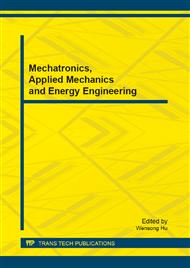[1]
Brenna D. Argall a, Sonia Chernovab, Manuela Veloso b, Brett Browninga, A survey of robot learning from demonstration, Robotics and Autonomous Systems 57 (2009) pg 469 – 483.
DOI: 10.1016/j.robot.2008.10.024
Google Scholar
[2]
Siciliano, Bruno; Khatib, Oussama A Handbook for Robotics, Springer publication, ISBN 978-3-540-30301-5, (2008).
Google Scholar
[3]
Kerr, U. Nehmzow, S.A. Billings, Towards Automated Code Generation for Autonomous Mobile Robots in, Advances in Intelligent Systems Research AGI-10, Atlantis Press. March (2010).
DOI: 10.2991/agi.2010.37
Google Scholar
[4]
Roberto Iglesias, Ulrich Nehmzow, Theocharis Kyriacou and Steve Billings, Modelling and characterisation of a mobile robot's operation Current Topics in Artificial Intelligence 11th Conference of the Spanish Association for Artificial Intelligence, CAEPIA 2005 Santiago de Compostela, Spain, Springer Verlag (2006).
DOI: 10.1007/11881216_49
Google Scholar
[5]
R. Iglesias, T. Kyriacou, U. Nehmzow, S.A. Billings, Task Identification and characterisation in mobile robotics through non-linear modeling, in Robotics and Autonomous Systems 55 (2007) pg267–275.
DOI: 10.1016/j.robot.2006.11.007
Google Scholar
[6]
Halit Bener Suay, Russell Toris, Sonia Chernova, Special Issue on Robot Learning from Demonstration, In International Journal of Social Robotics, August 2012, pg 319-330.
DOI: 10.1007/s12369-012-0158-7
Google Scholar
[7]
Baris Akgun, Maya Cakmak, Karl Jiang, Andrea L. Thomaz, Keyframe-based Learning from Demonstration Method and Evaluation, In International Journal of Social Robotics, August 2012, pg 343-335.
DOI: 10.1007/s12369-012-0160-0
Google Scholar
[8]
Daniel H. Grollman, Aude G. Billard, Robot Learning from Failed Demonstrations, In International Journal of Social Robotics, August 2012, pg 331-342.
DOI: 10.1007/s12369-012-0161-z
Google Scholar
[9]
Shuonan Dong, BrianWilliams, Learning and Recognition of Hybrid Manipulation Motions In Variable Environments Using Probabilistic Flow Tubes, In International Journal of Social Robotics, August 2012, pg 357-368.
DOI: 10.1007/s12369-012-0155-x
Google Scholar
[10]
Yasser Mohammad, Toyoaki Nishida, Fluid Imitation Discovering What to Imitate?, In International Journal of Social Robotics, August 2012, pg 369-382.
DOI: 10.1007/s12369-012-0153-z
Google Scholar
[11]
Brenna D. Argall, Brett Browning, Manuela M. Veloso, Policy Feedback for the Refinement of Learned Motion Control on a Mobile Robot, In International Journal of Social Robotics, August 2012, pg 383-395.
DOI: 10.1007/s12369-012-0156-9
Google Scholar
[12]
W. Bradley Knox, Brian D. Glass, Bradley C. Love, W. Todd Maddox, Peter Stone How Humans Teach Agents A New Experimental Perspective, In International Journal of Social Robotics, August 2012, pg 409-421.
DOI: 10.1007/s12369-012-0163-x
Google Scholar
[13]
Çetin Meriçli, Manuela Veloso, H. Levent Akın Multi-resolution Corrective Demonstration for Efficient Task Execution and Refinement, In International Journal of Social Robotics, August 2012, pg 423-435.
DOI: 10.1007/s12369-012-0159-6
Google Scholar
[14]
Rainer Jäkel, Sven R. Schmidt-Rohr, SteffenW. Rühl, Alexander Kasper, Zhixing Xue, Rüdiger Dillmann, Learning of Planning Models for Dexterous Manipulation Based on Human Demonstrations, In International Journal of Social Robotics, August 2012, pg 437-448.
DOI: 10.1007/s12369-012-0162-y
Google Scholar
[15]
Brian P. Gerkey, Richard T. Vaughan, and Andrew Howard, The Player/Stage Project: Tools for Multi-Robot and Distributed Sensor Systems, In Proc. of the Intl. Conf. on Advanced Robotics (ICAR), pages 317-323, Coimbra, Portugal, July (2003).
Google Scholar
[16]
A.A. Nippun Kumaar, Sudarshan TSB, Mobile Robot Programming By Demonstration, 2011 Fourth International Conference on Emerging Trends in Engineering & Technology, (ICETET-11), IEEE Computer Society, November 18-20, 2011, Mauritius. pg 206 – 209.
DOI: 10.1109/icetet.2011.30
Google Scholar


